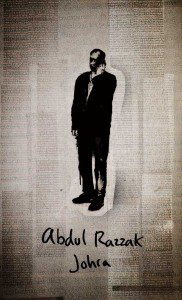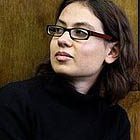3 Nov 2011 | News and features

Murdered 3 November 2008
Reporter, Royal TV – Punjab, Pakistan
Join us in demanding justice for Abdul Razzak Johra, 45, dragged by six armed men from his home in the Mianwali district of Punjab, Pakistan on 3 November 2008 and shot — a day after his TV report on local drug trafficking was aired nationally. Colleagues said Johra had received threats telling him to stop covering the issue. Police acknowledged the killing but took no evident steps to investigate. In 2011, the tragic toll of dead and injured journalists and media workers placed Pakistan ahead of Iraq and Mexico as the world’s most dangerous country for reporters and media professionals.
Take action and send a letter to the authorities demanding an immediate and open investigation into this case here
International Day to End Impunity is on 23 November. Until that date, we will reveal a story each day of a journalist, writer or free expression advocate who was killed in the line of duty.
2 Nov 2011 | Egypt, Middle East and North Africa
Prolific Egyptian blogger Alaa Abdel Fattah was detained on Sunday after refusing to be interrogated by a military investigator, insisting on his right to be tried before a civil court. Rasha Abdulla reports
Egyptian blogger Alaa Abdel Fattah (@alaa) was jailed on 30 October for 15 days pending investigation after refusing to be interrogated by a military investigator on charges related to the now infamous Maspiro events, in which over 20 people died and many more were injured after a brutal crackdown on a Christian-majority demonstration.
Alaa was called in for investigation last week. He was active in the aftermath of the event, having spent two days at the morgue alongside other activists in solidarity with victims’ families, while trying to convince them to agree to autopsies and ensure the reports of said autopsies were correctly documented. He detailed the experience in a piece for Al Shorouk newspaper (a translation of which can be found here), in which he reminded everyone that solidarity is the solution to Egypt’s problems. Alaa has been detained before, in 2006 he spent 45 days in jail, a piece he wrote from behind bars was published today entitled “A Return to Mubarak’s Jails.”
Alaa was in San Francisco when he was asked to report last week. His father, veteran human rights lawyer Ahmed Seif El Islam Abdel Fattah, appeared in court and asked for the case to be postponed. Alaa returned to Cairo on Saturday afternoon and appeared in court on Sunday morning. The military prosecutor filed five charges against him including demonstrating, inciting to demonstrate, assaulting military personnel, destroying public property, and stealing military weapons. Alaa, whose sister Mona Seif (@monasosh) is one of the founders of the No to Military Trials for Civilians campaign refused to recognise the authority of an civic judge. He pointed out that the army is facing law suits accusing it as a defendant in the same case, which constitutes a clear conflict of interest. As a result he was detained, pending further military investigation.
Alaa has been active on the blogging scene in Egypt since 2004, when he and his wife Manal Hassan (@manal) started the award-winner blog and aggregator Manal and Alaa’s Bit Bucket. Both bloggers fought the Mubarak regime online and offline, breaking cases of corruption and police brutality that were later picked up by the traditional media.
Many believe Alaa’s detention is a warning to other bloggers and political activists, a ratcheting up of the series of violations against free expression committed by Egypt’s ruling Supreme Council of Armed Forces (SCAF). The violations include summons sent to journalists Rasha Azab (@rashapress) and her editor, Adel Hammouda, over Azab’s coverage of a meeting between the No to Military Trials group and SCAF in which allegations that SCAF subjected female demonstrators to virginity tests were discussed. Later, when journalist and blogger Hossam El Hamalawy discussed SCAF on a popular Egyptian talk show, he and his show host, Reem Magued, were both called in before the military prosecutor. That visit was later described by the prosecutor as “a chat.” Other bloggers that have been interrogated and/or detained including Asmaa Mahfouz, Loai Nagati, and Maikel Nabil, who has been on a hunger strike since 22 August.
A military court sentenced Maikel Nabil to three years for “insulting the military & spreading false reports aiming to disturb public security.” The charges relate to a May blog entitled “The army and the people are not one hand,” in which he listed the army’s alleged wrongdoings, including the virginity tests claim. Maikel, who has a heart condition, was tried 12 days after being arrested on 28 March.
Other free expression violations have been committed on the satellite television front. In recent months, army police forces have raided the offices of Al Jazeera Mubasher Misr several times, as well as 25TV channel. Al Jazeera Mubasher has since been banned from broadcasting from Egypt, accused of incomplete licensing procedures. Most recently, popular television host Yosri Fouda chose to indefinitely suspend his highly-viewed political talk show because he felt he was under pressure to not report things as he sees them and did not want to force himself through “self-censorship.” He told the BBC that he did not want to “take the narrative of the army” and would rather step back in protest of the military rulers’ attempts to “stifle free expression.”
The No to Military Trials campaign, which has been actively lobbying on behalf of all military detainees, has published a press release condemning Alaa’s arrest in the strongest possible words, and asking for his immediate release, together with the other 12,000 victims of military trials in Egypt, who should at least be retried before a civil court. The group called upon Egyptians to refuse to cooperate with military interrogation and to support the cause of No to Military Trials for Civilians. You can read the press release in its entirety here. A press conference by the group is scheduled for tomorrow, 3 November, at 2pm Cairo time.
Rasha Abdulla is an associate professor at the Journalism and Mass Communication Department of the American University in Cairo. An advocate for freedom of expression, Abdulla has published several books and writings on Internet use and digital activism in Egypt and throughout the Arab World. You can follow her on Twitter:@RashaAbdulla
2 Nov 2011 | Middle East and North Africa, Uncategorized
 Former IDF soldier Anat Kamm’s 4.5 year prison sentence shows the contradictions of Israel’s attitude towards leaks. Elizabeth Tsurkov reports
Former IDF soldier Anat Kamm’s 4.5 year prison sentence shows the contradictions of Israel’s attitude towards leaks. Elizabeth Tsurkov reports
When the Tel Aviv District Court sentenced Anat Kamm to four-and-a-half years in prison for leaking classified documents she obtained during her IDF service to the daily Haaretz, few Israelis were bothered. And no wonder, as Kamm was branded as a traitor and a spy by the security establishment, and most pundits since the gag order on her case had been lifted in April 2010. Most of the Israeli public didn’t seem concerned about the consequences this sentence will have on press freedom in Israel, but this lack of concern doesn’t make the repercussions of this sentence any less real.
Journalists rely on leaks and sources willing to talk to them and share information, which at times are obtained illegally and is disclosed without permission. The Israeli press is strewn with leaks, most of which are the product of political fights and bickering, and their purpose is to harm political rivals, not scrutinise the security establishment.
For example, in late 2006, Prime Minister Olmert attacked his Defence Minister Peretz for a phone call he had with Palestinian Authority President Abbas without informing Olmert himself.The attack revealed top secret information, namely that Israel wiretaps the phones of Abbas.
The Kamm verdict stated that it wasn’t necessary for the prosecution to prove harm was done to Israel’s security as a result of the leak, and the mere possibility of such harm was enough to convict Kamm. Judging by this standard, Olmert’s leak of highly sensitive information solely for political purposes was surely harmful Israel’s security.
Other common forms of leaks in the country are authorised declassifications by security services or leaks by government officials, which are intended to serve the political goals of the state of Israel. The occasional leaks by unnamed Israeli government official about the country’s intentions to attack Iran’s nuclear facilities are an example for such calculated moves, which are intended to spur the international community into action against Iran. Both these forms of leaks, the ones caused by political infighting and the calculated declassification, under the appearance of free press, are intended to serve the establishment, or at least the parts of it that leaked the information. These leaks provide a one-sided view of reality, according to the interests of the leaking party, and rarely serve any oversight capacity.
Israeli media rarely reports critically on the IDF, let alone other security organs, partly out of misplaced patriotism, but also because Israeli media lacks sources that are willing to reveal information about wrongdoings of the country’s security establishment. Critical coverage and public accountability of the security services are all the more necessary considering the little oversight the Knesset has over the security establishment due to issues of security clearances, and the culture of impunity that pervades Israel’s security organs.
Several of the documents Kamm provided to Haaretz reporter Uri Blau showed the IDF was still carrying out targeted assassinations of Palestinians suspected of terrorist activity when their capture was possible, against the explicit ruling of the Supreme Court. The officers who ordered and approved this illegal policy were not charged by the Attorney General. Instead, Israel’s justice system chose to punish a person who attempted to fight the IDF’s culture of impunity and disregard for the law.
Elizabeth Tsurkov is an Israeli writer and a contributor to +972 Magazine and Global Voices Online. You can follow her on Twitter: @elizrael.
2 Nov 2011 | News and features
The Charlie Hebdo bombing exposes a gulf in understanding between the secular French establishments and Muslim immigrants, says Myriam Francois-Cerrah

The firebombing of Charlie Hebdo offices following its decision to run an edition featuring the prophet Mohammed as “guest editor”, is a sad reflection of France’s uneasy relationship to Islam and religion more generally.Sadly, there are some who do not believe that Charlie Hebdo should have the right to publish a satirical issue, in which it presents Prophet Mohamed as the inspiration of the Arab revolutions and subsequent rise of islamist parties in the region (regardless of the accuracy of this link!). They are no doubt in a minority, just as those who committed this crime will no doubt be revealed to be a fringe group or renegade individuals.
But there is no denying the fact many Muslims are offended by the decision to run an issue entitled “Charia Hebdo”, with reference to “100 lashings if you don’t die of laughter” (chuckle) and a “halal aperitif” (ha!) and perhaps more pertinently, to run images of Prophet Mohammed.
Charlie Hebdo is renowned for being a highly satirical outlet which pushes the limits of public discourse on any given issue through its provocative illustrations and irreverent style. It has in its time, been accused of being anti-Semitic, anti-Catholic and now Islamophobic to boot and would no doubt parade these accusations as badges of honour.
However the recent issue comes at a complex time in France’s political life. The far right has made large advances, gaining 15 per cent of the vote in recent regional elections and they have maintained the “immigration question” near the top of the political agenda, drawing parallels between Muslims praying in the street and the Nazi occupation. Meanwhile, recent stats suggest that amongst the descendants of immigrants, 70 per cent, compared with 35 per cent amongst recent immigrants, consider that the French government does not respect them, including amongst those possessing university degrees and thus in theory, more “integrated” into the social fabric.
French Arabs face unemployment at a rate of 14 per cent compared with 9.2 per cent amongst people of French origin — even after adjusting for educational qualifications and are poorly represented at every level. Charlie Hebdo’s decision to poke fun at Islam, although completely inline with its treatment of other issues, comes at a time of intense polemics over the place of Islam within France, as debates over “laicite” galvanise the political spectrum.
Many Muslims appear to feel under siege in a political climate which continues to view Islam as an impediment to full adhesion to French national identity and where religious practise is associated with a social malaise. Indeed, a recent report by the French academic Gilles Kepel has reignited debate over the role Islam plays in the perpetuation of disenfranchisement in the suburbs, where Muslims are over-represented.
Some in France have sought to blame Islam for the high levels of unemployment, underachievement, violence and marginalisation in France’s ghettoised suburbs, while others have protested the Islamification of the discourse on the suburbs, decrying the use of confused and loaded terminology to overlook substantial economic and social problems in these areas. In France, with or without the caricatures, Islam is a sore topic with many recent polemics related to Islamic practises, whether the face veil debate, street prayers or the building of new mosques.
French Muslims are regularly told — even by the President — that you either “love France or you leave her”, reinforcing their status as outsiders, and a right-wing discourse which promotes ridiculous predictions of a Muslim take over of Europe through high birth rates and proselytising, is gaining ground. Christopher Caldwell, a contributor to the Financial Times recently published an inflammatory book Reflections on the Revolution In Europe: Immigration, Islam, and the West which has gained widespread media coverage, including on mainstream French TV, with its thesis that Europe is doomed in the face of a Islamic cultural invasion. In this context, marked by fear of Islam’s alleged resurgence, intractability and incompatibility with “French culture”, as well as the inability of many French Muslims to present an alternative perspective on an equal platform, are the seeds of profound social malaise.
Satire of religion has a long history in France and Christians are not exempt from what some groups have deemed insensitive and injurious portrayals of sacred persons or ideas. Since its launch on 20 October, Christian groups have regularly interrupted the Paris based theatrical production of “On the concept of the face of the son of God” (Sur le concept du visage du fils de Dieu) for its perceived blasphemy and “Christianophobia”.
The play features an elderly man defecating on stage and his son coming to clean his back side, using the portrait of Jesus. The excrement collected is then used at the end of the play by children as missiles to be thrown at the portrait of Christ, whilst at the end of the production, a black veil of excrement glides down the portrait of Jesus. In April this year, an art exhibit entitled Piss Christ, featuring a crucifix immersed in a glass containing blood and urine was vandalised by Christians outraged by the piece. Some religious groups have accused the arts and the media to resorting to crass provocations to raise the profile of otherwise mediocre artistic endeavours which might not have garnered public attention without the controversy.
Charlie Hebdo’s current confrontation with Islamic polemics is not its first. In 2008, it won a legal case against accusations of incitement to racial hatred when it chose to reprint the Danish cartoons, launched by the French Muslim Council (CFCM) and the Grand Mosque of Paris. Interviewed on recent events, Mohammed Moussaoui, president of the CFCM has both condemned the attack on Charlie Hebdo and the printing of the irreverent images.
Describing the decision to print images known to be offensive to Muslims as “hurtful” and questioning the association of the caricatures of Prophet Mohamed with events in Tunisia or Libya, he defended the right of those who opposed the decision to protest as well as the freedom of the press to print the said images and explained that in a plural society, people’s relationship to the sacred will necessarily vary.
The attack on the press outlet, Charlie Hebdo is symptomatic of the broader unease French society is facing in light of a growing visible Muslim minority. While successive generations of “French” origin are getting more secular in their outlook, with around 60 per cent of youths saying in 2008 that they had no religious belief, the pattern among the children of immigrants from north Africa, Sahel and Turkey is the opposite, as religion gains in importance, particularly among the young.
How France negotiates an inclusive public sphere in which the views of all its citizens, including those who abide by a religious tradition, are reflected remains a stark challenge. It is telling that Charlie Hebdo chose Mohammed as “guest editor”, rather than a contemporary figure who could express an accurate reflection of French Muslim opinion on current affairs — instead, it chose the route of ease, ascribing archaic and reactionary ideas to a sacred figure, his ideas rigidified and frozen in a literalist caricature, which although undoubtedly humorous in parts, is completely out of sync with how most Muslims understand Islam’s relationship to the modern context. This issue might be its best-selling; the real question though ought to be, is it its best?
Myram Francois-Cerrah is a writer, journalist and budding academic


 Former IDF soldier Anat Kamm’s 4.5 year prison sentence shows the contradictions of Israel’s attitude towards leaks. Elizabeth Tsurkov reports
Former IDF soldier Anat Kamm’s 4.5 year prison sentence shows the contradictions of Israel’s attitude towards leaks. Elizabeth Tsurkov reports